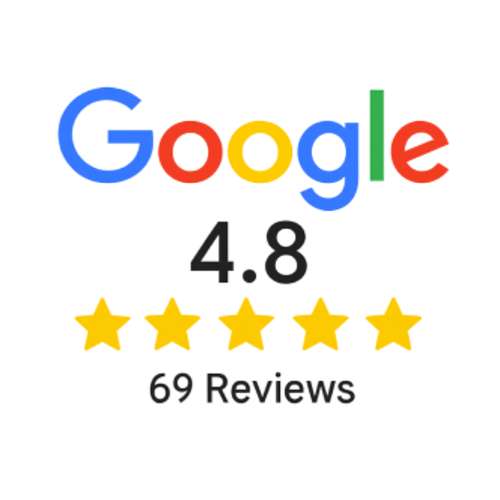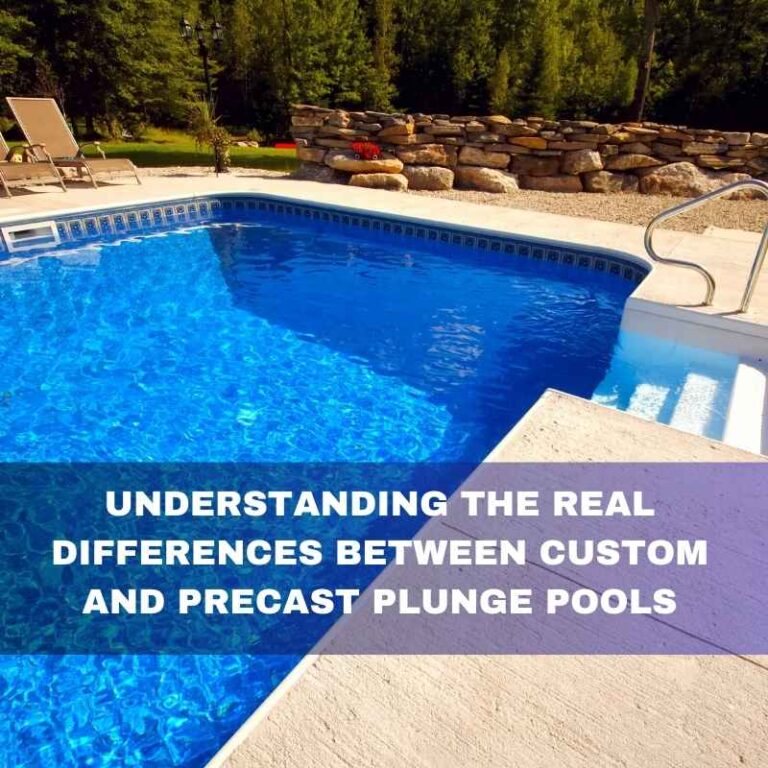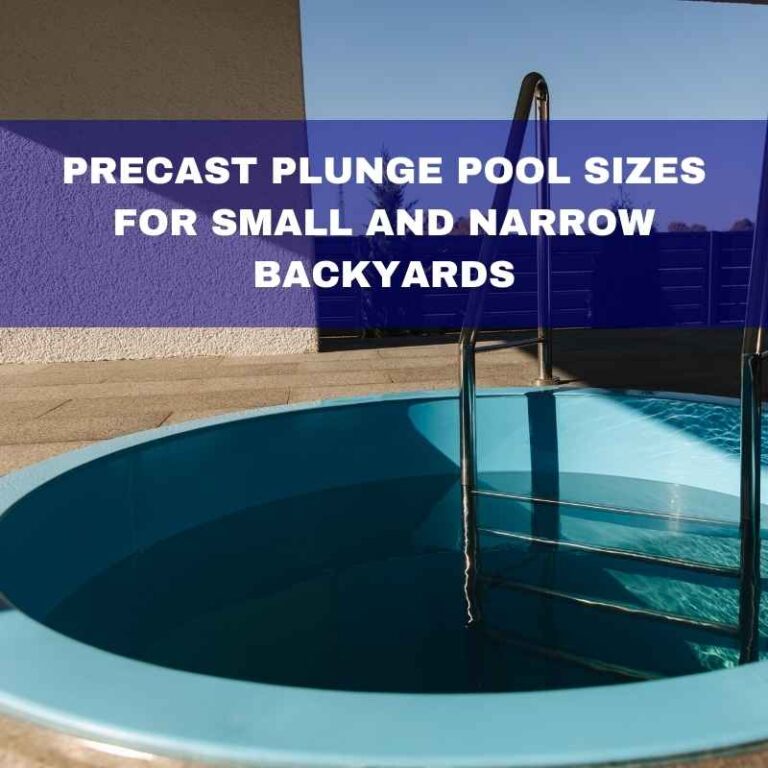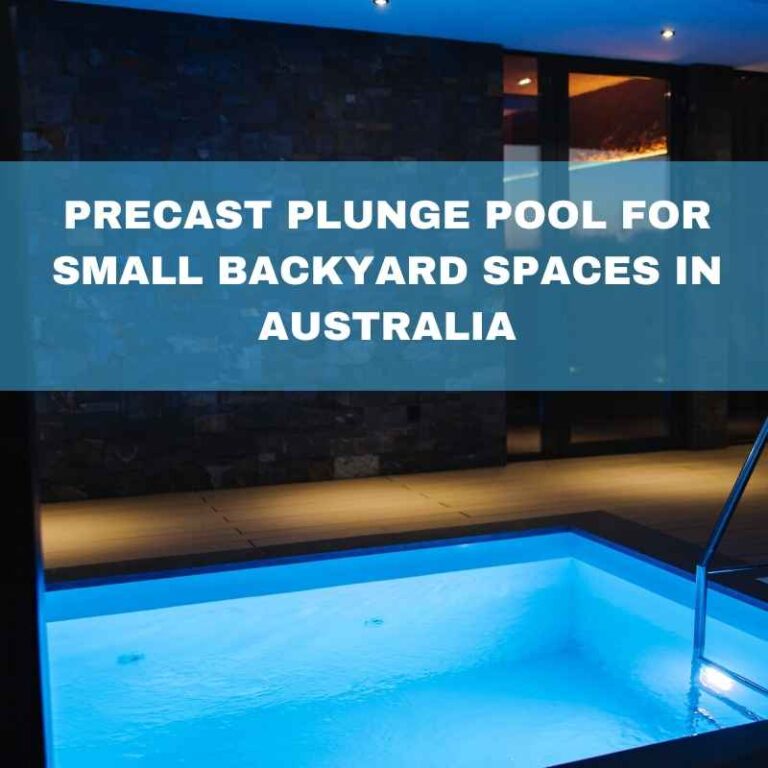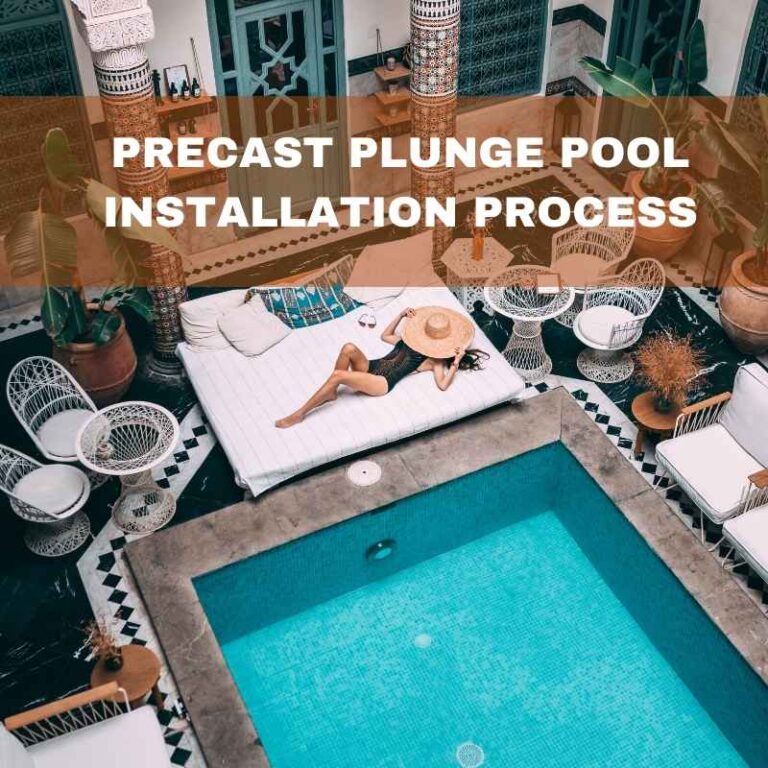At Plunge Pools Newcastle, we’ve spent years installing plunge pools across Newcastle, helping homeowners maximise their space and create the perfect backyard retreat. We know exactly what works—and what doesn’t.
This guide breaks down the real pros and cons. Everything you need to know before deciding if a plunge pool is the right move for you. Let’s get into it.
Table of Contents
ToggleKey Takeaways
- Space-saving solution: Perfect for small backyards, courtyards, or tight urban spaces.
- Lower costs: Cheaper to install and maintain than traditional pools.
- Energy-efficient: Uses less water and energy—especially with solar heating and covers.
- Year-round use: With proper heating, it’s a spa in winter and a cool-off zone in summer.
- Customisable: Jets, lighting, seating—designed your way.
- Not for everyone: Limited space means it’s not ideal for laps, parties, or diving.
- Regulations matter: Council approval and safety compliance are essential in Newcastle.
What Defines a Plunge Pool and How Does It Work?
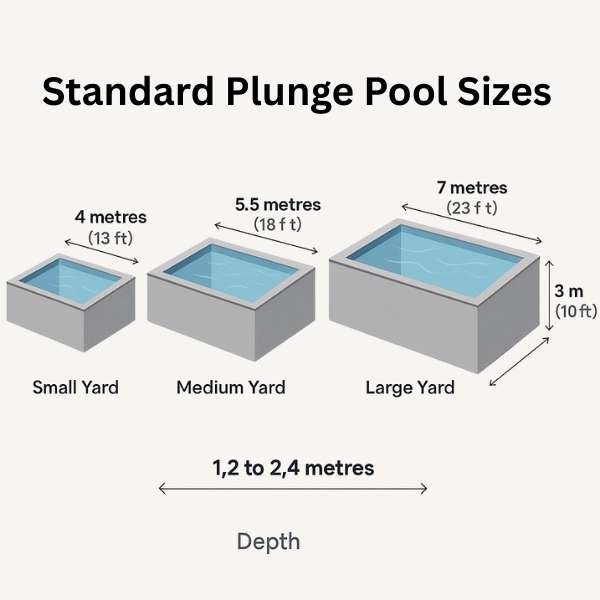
Small. Deep. Built for relaxation, cooling off, and light exercise—not laps, not big gatherings, just pure, efficient use of space. A plunge pool gives you the luxury of a pool without the hassle of a full-sized one.
Here’s what matters:
- Size – Compact. 4 to 7 metres long, 2 to 3 metres wide. Perfect for small backyards.
- Depth – 1.2 to 2.4 metres. Deep enough for full-body immersion, shallow enough to be safe.
- Materials – Fibreglass, concrete, or acrylic—each with its own durability, cost, and aesthetic appeal.
- Installation –In-ground, above-ground, or pre-built. Custom or ready-to-go.
- Features – Hydrotherapy jets, heating, built-in seating, LED lighting. Make it a spa, a statement, or both.
Because durability, installation speed, and long-term maintenance vary widely, many Newcastle homeowners compare concrete vs fibreglass vs precast plunge pools to see which material best suits their soil conditions, backyard layout, and lifestyle needs.
What Are the Main Benefits of Installing a Plunge Pool?
A pool that fits anywhere, costs less, and works year-round—that’s what a plunge pool offers. Whether you’re looking to maximise a small backyard or just want the benefits of a swimming pool without the hassle, a plunge pool delivers.
1. Space-Saving & Compact Design
- Fits where traditional swimming pools won’t. Small backyards, courtyards, patios—no problem.
- Above-ground or in-ground options. Install based on your space and budget.
- Enhances your outdoor area. Integrates seamlessly into decks, gardens, and entertaining spaces.
2. Lower Installation & Maintenance Costs
- Costs less to install than a full-sized pool.
- Uses less water and fewer chemicals, meaning lower maintenance expenses.
- Quicker installation, so you’re swimming in weeks—not months.
Testimonial: Our plunge pool was installed in just over two weeks and cost less than half what we were quoted for a standard pool. It’s incredibly easy to maintain, and we barely spend $30 a month on upkeep—even with the heating turned on in winter. It’s been a stress-free addition to our home. — Laurine, Mayfield
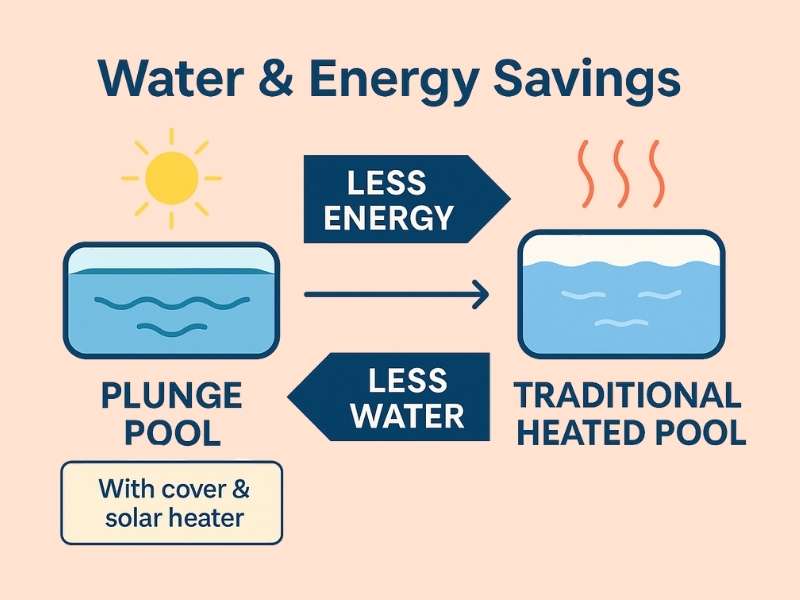
3. Energy Efficiency & Sustainability
- Less water consumption makes it an eco-friendly choice.
- Energy-efficient heating options (solar, heat pumps) keep running costs low.
- Easily covered to prevent evaporation and retain heat.
4. Customisable Features for Relaxation
- Hydrotherapy jets turn it into a spa.
- LED lighting, built-in seating, and water features enhance comfort and style.
- Temperature control means you can use it all year round.
5. Health & Wellness Benefits
- Perfect for hydrotherapy, muscle recovery, and stress relief.
- Great for low-impact exercise like water aerobics or stretching.
- Cools you down in summer, warms you up in winter.
A plunge pool gives you all the benefits of a pool—without the hassle. Less space, less work, lower costs—maximum enjoyment.
What Are the Downsides of a Plunge Pool?
Plunge pools are efficient, stylish, and low-maintenance, but they’re not for everyone. If you’re expecting a lap pool, a party space, or a dive-friendly deep end, think again. Here’s what you need to consider:
1. Limited Space & Functionality
- Plunge pools are smaller than traditional pools, making them unsuitable for lap swimming unless equipped with resistance jets.
- Not ideal for big gatherings. Limited space means fewer people can enjoy it at once.
- No diving, no water games. The depth is designed for soaking, not high-energy activities.
2. Unexpected Installation Costs
- Excavation and groundwork can still add up, especially on tricky terrain.
- Permits and council approvals may be required, depending on location.
- Upgrades cost money. Heating, jets, and filtration systems aren’t free.
From Our Experience: One of our clients in Merewether needed additional drainage work due to a sloped yard, which increased installation time by a week. This is a common issue in hilly suburbs around Newcastle.
3. Heating Costs for Year-Round Use
- Cold water isn’t for everyone. Heating is optional but often necessary.
- Electric and gas heating add to your energy bill.
- Insulation and covers help, but they’re another upfront expense.
4. Safety Considerations
- Deep water + kids = potential risk. Fencing and safety covers are a must.
- Slippery surfaces increase the chance of falls.
- Compliance with local regulations may require extra investment.
Plunge pools aren’t for fitness swimmers, large families, or those wanting a full-sized pool experience. They’re for homeowners who want to maximise their outdoor space with a relaxing, efficient, and stylish water feature—without the bulk and maintenance of a traditional pool.
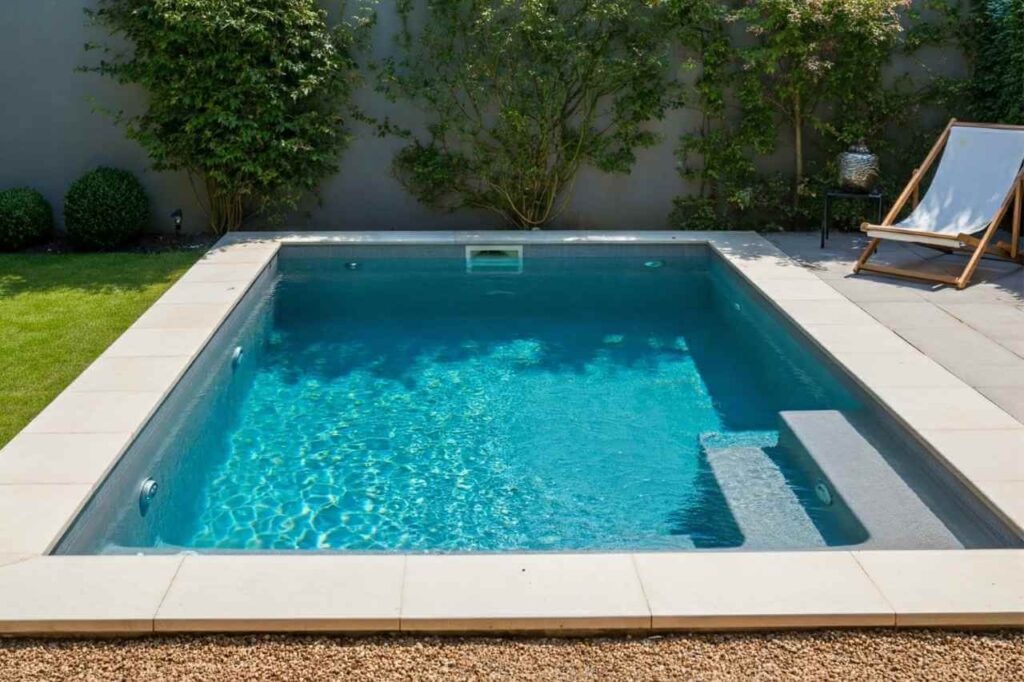
How Do Plunge Pools Compare to Hot Tubs, Swim Spas, and Lap Pools?
Plunge pools are small, efficient, and built for relaxation—but they’re not the only best option. Depending on your needs, a hot tub, swim spa, or lap pool might be a better fit. Here’s how they stack up:
Comparison Table: Plunge Pools vs. Other Pool Alternatives
| Feature | Plunge Pool | Hot Tub | Swim Spa | Lap Pool |
|---|---|---|---|---|
| Size | Small (4-7m) | Very small (2-3m) | Medium (4-6m) | Large (10m+) |
| Purpose | Relaxation, cooling off, light exercise | Relaxation, hydrotherapy | Swimming, exercise, relaxation | Fitness and lap swimming |
| Maintenance | Low | Low | Medium | High |
| Installation | Quick (1-8 weeks) | Fast (1-2 days) | Moderate (2-4 weeks) | Long (4-12 weeks) |
| Space Needed | Small | Very small | Medium | Large |
| Swim Capability | Limited (with jets) | No | Yes | Yes |
| Year-Round Use | Yes (if heated) | Yes | Yes | Depends on heating |
| Water Depth | 1.2-2.4m | 1m | 1.2-1.5m | 1.2-2m |
| Best for | Small backyards, relaxation | Relaxation, hydrotherapy | Swimming, therapy, fitness | Fitness, lap swimming |
Who Should Get a Plunge Pool and Who Shouldn’t?
A plunge pool isn’t for everyone. It’s built for relaxation, not laps. It saves space, costs less than a full-sized pool, and requires minimal upkeep. But if you’re after a traditional swimming experience, you might need something bigger.
Who Benefits Most?
A plunge pool is a smart choice if you:
- Have limited space. Small backyards, courtyards, tight outdoor areas—it fits where others won’t.
- Want low maintenance. Less water, fewer chemicals, minimal cleaning.
- Prioritise relaxation. Hydrotherapy, stress relief, and cooling off—all in one.
- Need a cost-effective option. A fraction of the price of a full-sized pool.
- Want year-round use. Heat it up in winter, cool off in summer.
Who Might Need an Alternative?
Skip the plunge pool if you:
- Need a pool for exercise. No laps unless you install resistance jets.
- Host big gatherings. Small size means limited guest capacity.
- Have young children. Depth can be a safety risk without proper precautions.
- Want a traditional swimming experience. No diving, no water games, no sprawling swim space.
If a plunge pool doesn’t match your needs, consider a swim spa, lap pool, or traditional pool instead.
Still deciding if a plunge pool is the right fit for you?
Chat with our local expert—no pressure, just answers.
Book a 15-Minute Call ➔Understanding Local Council Approval for Plunge Pools
Installing a plunge pool isn’t just about choosing the right size or shape—it’s also about navigating the rules that govern where and how it can be placed. In Australia, local council regulations are not mere bureaucratic formalities. They are essential design constraints, embedded with the intent to protect people, property, and the environment.
In Newcastle, for example, the approval process is guided by the NSW Swimming Pools Act 1992 and Swimming Pools Regulation 2018. These rules are not arbitrary—they are the product of decades of design failures, safety incidents, and environmental considerations.
Why Approval Matters
It’s easy to think of a plunge pool as a simple backyard addition. But from a regulatory perspective, it’s a structure with serious implications: it holds a large volume of water, poses a drowning risk, alters stormwater flow, and changes land use. The council’s approval process ensures that:
- Setback rules are observed—your pool must sit a certain distance from property boundaries and structures.
- Fencing requirements meet safety codes—childproof, climb-resistant, and properly gated. This regulation outlines the requirements for pool safety, including fencing standards, barrier specifications, and compliance procedures. It’s essential for homeowners and builders in Newcastle and across New South Wales to familiarize themselves with these regulations to ensure their plunge pools meet all legal safety standards
- Drainage and water runoff are managed to avoid flooding or erosion on adjacent properties.
This is more than compliance—it’s responsible design.
The Newcastle Approval Process in Practice
- Planning Approval: Some plunge pools are exempt from planning approval under the State Environmental Planning Policy (Exempt and Complying Development Codes) 2008. But only if they meet specific criteria—distance from boundaries, location relative to sewers and easements, and so on. Otherwise, a Development Application (DA) is required.
- Building Approval (Construction Certificate): Whether exempt or not, you’ll likely need a Construction Certificate from a private certifier or the council. This covers structural safety and environmental management.
- Final Inspection & Compliance Certificate: Once installed, your plunge pool must be inspected and certified as compliant. This includes fencing, gate latching, and CPR signage.
What Most Homeowners Get Wrong
Most non-compliance issues don’t arise from rogue builders—they arise from assumptions. Homeowners often assume that a smaller pool means fewer rules. In fact, councils view plunge pools through the same safety lens as full-sized ones.
A Better Approach
Think of council approval not as a hurdle, but as part of the user-centred design process. The rules reflect learned lessons—sometimes painful ones—about what works and what doesn’t in real-world conditions. When approached early and thoughtfully, the approval process can actually improve your design: better drainage, safer access, smarter use of space.
Conclusion
There you have it—the real pros and cons of owning a plunge pool. Less maintenance, less cost, less space—but still all the benefits of having your own private water retreat.
At Plunge Pools Newcastle, we’ve helped homeowners across Newcastle transform their backyards with custom plunge pool solutions. Quality materials, expert installation, and designs that fit your space and budget.
Ready to turn your backyard into a private oasis?
We’ll help you design and install the perfect plunge pool.
Contact Our Team Today ➔About Plunge Pools Newcastle
At Plunge Pools Newcastle, we specialise in designing and installing custom plunge pools tailored for homes across Newcastle. With over a two decades of experience, we understand how to maximise backyard space without compromising on style, safety, or sustainability.
Our team brings together licensed builders and pool designers—all local to Newcastle. We work closely with homeowners from concept through to completion, ensuring every project complies with NSW regulations and reflects the lifestyle needs of our community.
Disclosure: The information provided in this article is based on insights from over 100 plunge pool installations completed by our team. We combine first-hand installation data, customer feedback, and current council regulations to deliver practical, experience-backed guidance.
Where comparisons are made—such as to hot tubs, lap pools, or full-size pools—they are drawn from both industry benchmarks and direct observations from our projects. Costs mentioned are indicative only and can vary by site conditions, materials, and features selected.
Plunge Pools Newcastle is a commercial installer of plunge pools. While we stand behind the benefits of plunge pools, we always aim to present a balanced view of the pros and cons to help homeowners make informed, transparent decisions.
Frequently Asked Questions
1. Can a plunge pool be used for exercise?
Yes, but with limitations. While a plunge pool is not designed for lap swimming, you can install swim jets to create resistance for stationary swimming. It is also great for low-impact exercises like water aerobics, stretching, and hydrotherapy.
2. Are plunge pools expensive to maintain?
No, plunge pools are cheaper to maintain than traditional pools. They require less water, fewer chemicals, and minimal cleaning. However, costs can increase if you install heating or additional features like jets and lighting.
3. Can a plunge pool be heated?
Yes, many plunge pools include heating systems such as electric, gas, or solar heat pumps. This allows you to use your pool comfortably year-round, even in colder months.
4. How long does it take to install a plunge pool?
The installation time depends on the type of plunge pool:
- Pre-built (fibreglass or acrylic models) – Can be installed in 1 to 2 weeks.
- Concrete or custom-built pools – Typically take 4 to 8 weeks, depending on excavation, permits, and finishing.
5. Is a plunge pool a good investment for my home?
Yes, a plunge pool can increase property value by enhancing outdoor appeal and providing a relaxation space. It’s a great option for homeowners who want a cost-effective, low-maintenance alternative to a full-sized pool.
